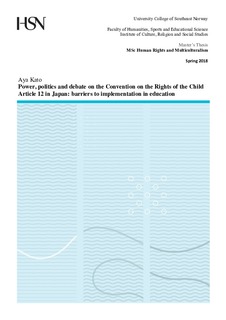Power, politics and debate on the Convention on the Rights of the Child Article 12 in Japan: barriers to implementation in education
Master thesis
Permanent lenke
http://hdl.handle.net/11250/2560985Utgivelsesdato
2018Metadata
Vis full innførselSamlinger
Sammendrag
This thesis examines tensions between the right of child democratic participation as an ideal encapsulated in the United Nations Convention of the Child Rights (CRC) and how this ideal has been implemented in Japan. Despite ratification of the CRC in 1994, the provision of Article 12 has not been endorsed in the national law of education. The thesis questions are a) Why is the CRC Article 12, ‘the right of the child to be heard’, not endorsed in Japanese education law? b) What are the obstacles preventing the full implementation of the CRC Article 12 in Japanese education? Derrida’s ‘hospitality concept’ is used as a theoretical framework to explore the possibility of including children and youth in the demos. The thesis presents and analyses Parliamentary debate data since 1991 to 2016 and interviews with policymakers and school authorities. Laclau and Mouffe’s discourse theory is applied in the Parliamentary data analysis. This thesis concludes that the Japanese government has prioritized public order at school over students’ individual human rights, and prioritized students’ contribution to the nation state over their democratic participation. These two norms have underpinned government policies since the late 1950s. The Japanese state has continued to emphasize economic growth and has opposed collective political action. An ideological ‘allergy’ towards collective protest since the Cold War provides the background to this policy, since Japanese society experienced largescale and socialist-inspired student protests during this period. One party’s power domination since 1955 and the U.S.A.’s post WW2 democratization and military policy, which intended to contain communism in Japan, has supported this approach. Currently, in line with an economic policy which emphasizes ‘global’ competitiveness, students’ democratic action is intentionally labelled as ‘socialist’ in a political discourse that favours economic liberalism
